Faces of Wuhan
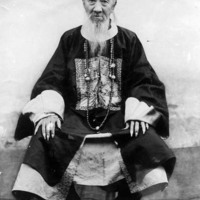
Photo of Zhang Zhidong in Court Dress
Zhang Zhidong, born September 2nd, 1837, was a dedicated Qing official and an influential reformist. He was a passionate student, passing the first-level of civil service exams at 13 and had completed all the levels by 26. Zhang was first an educator and then an adminstrator, working in Tianjin, followed by Guangzhou, Wuchang, and finally Beijing. He dedicated a large part of his work and life to the Self-Strengthening movement, believing in the flexible adoption of Western knowledge and technology to preserve the Qing state.
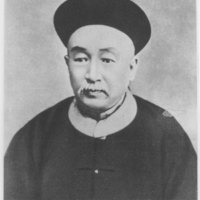
Sheng Xuanhuai
Sheng Xuanhuai was born November 4th, 1844 in Jiangsu province. He was an influential entrepreneur and statesman who contributed significantly to China's early industrialization. In 1870 Sheng joined the staff of Li Hongzhang, a powerful politician and rival to Zhang Zhidong. In 13 years he had taken control over the China Merchant's Steam Navigation Company, established the Imperial Telegraph Administration, and in 1896 acquired the Hanyang Ironworks from Zhang Zhidong.
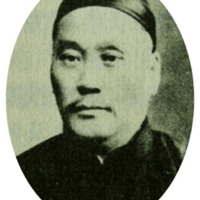
Song Weichen
Song Weichen, born in 1866 in Zhejiang, was an early industrial entrepreneur whose investments would contribute to the tranformation of Hankou into one of China's foremost industrial cities. He became the director of the Suihua match factory established in Hankou by match industry giant Ye Chengzhong, and turned his profits from that venture into a fortune which he used to invest in other emerging companies in the Wuhan area. One of his largest contributions was towards the establishment of the Jiji Hydropower plant, which provided the Chinese city with its first piped water and electric power.
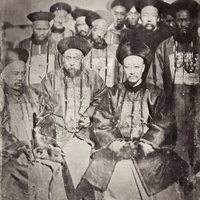
Guanwen 官文, Governor General of Huguang with his suite, Hankou, 1858
Guan Wen, born 1798, was a Manchu official appointed as Governor-General of Huguang – or Hubei and Hunan provinces – during the Second Opium War. Guan Wen precided over the establishment of the British Concession in Hankou, and was influential in securing proper compensation for the 2,500 families forced off their land by the British.
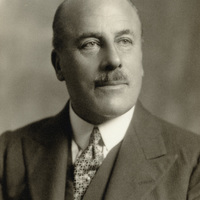
G. Warren Swire
George Warren Swire was born 1883 in London, as the only child of John Samuel Swire and Marry Nee Warren. In 1904 G. Warren became a partner in his father's firm, John Swire & Sons, which dealt in imports and exports from China. Every 3 to 4 years Swire would travel to China to visit the company's properties in Shanghai, Hankou, and other cities. Swire was a keen photographer, and his visits to Hankou between 1906 and 1940 contributed a large number of the photographs seen in the Industry and Bund sections of this site.
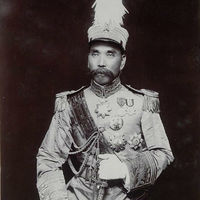
Wang Zhanyuan
Wang Zhanyuan was born February 20, 1861, and began his military career early on by joining the Tianjin Military Academy in 1886. In 1895 he joined the Tianjin division of Yuan Shikai's new Beiyang army. During the 1911 Revolution he led a large contingent of troops in battle against the Wuchang revolutionaries, maintaining a stalemate which allowed Yuan to broker an agreement that would establish the first Chinese republic. After this Wang remained in Wuhan, and after Yuan's death in 1916 Wang became the warlord of Hubei. His poor management of the provinces economy and failure to adequately pay his soldiers would lead to his outsing in 1921.
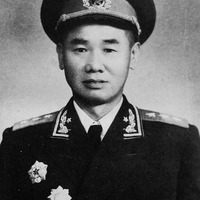
Chen Zaidao
Chen Zaidao, born 1909, was the commander of the Wuhan Military Region during the Wuhan incident. Despite attempts to comply with the center's policy aims, Chen was labeled as a counter-revolutionary and munineer, being forcively dismissed following the incident. However, in 1972 like many others who had fallen during the Cultural Revolution, Chen was rehabilitated and rejoined the party.
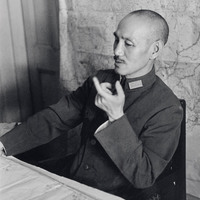
General Chiang Kai-shek at meeting of Supreme War Council
General Chiang Kai-shek (October 31, 1887 - April 5, 1975) was a military leader and politician. He was an influential member of the Chinese Nationalist Party and served as leader of the Republic of China, both in the mainland and later in Taiwan. He served as Chairman of the Military Affairs Comission from December 15, 1931 to May 31, 1946. Wuhan served as the wartime capital in 1938 and during that period General Chiang Kai-shek led from Wuhan. His wife, Soong Mei-ling, was very influential in supporting the refugee crisis in Wuhan, among her many other accomplishments.